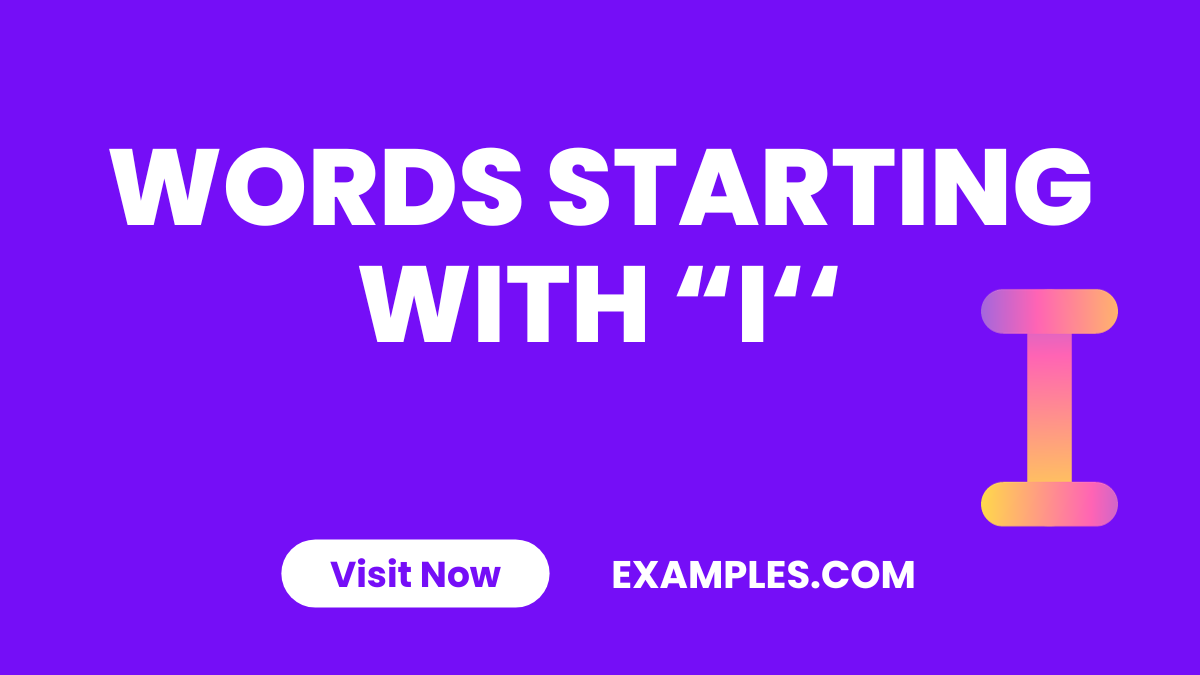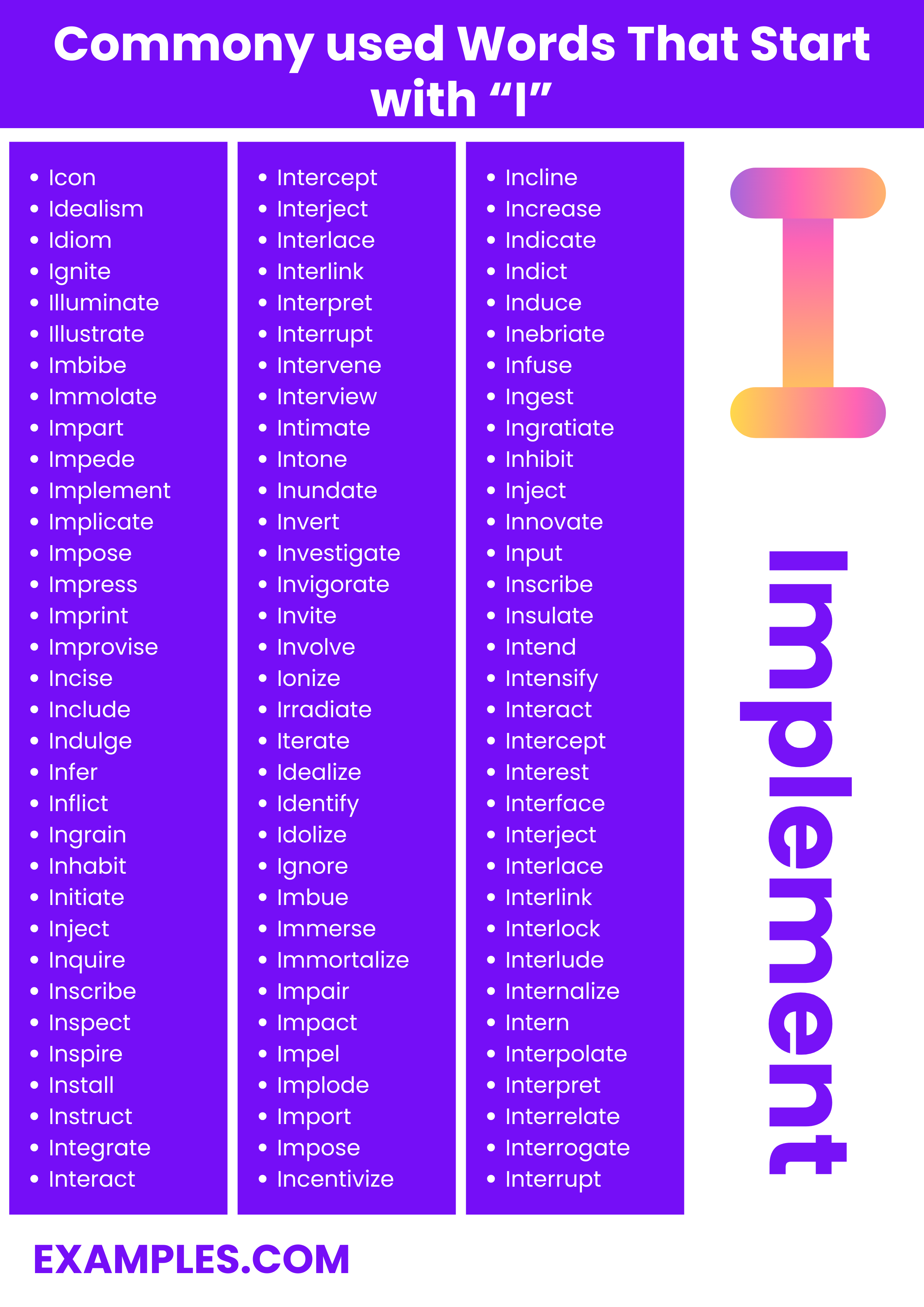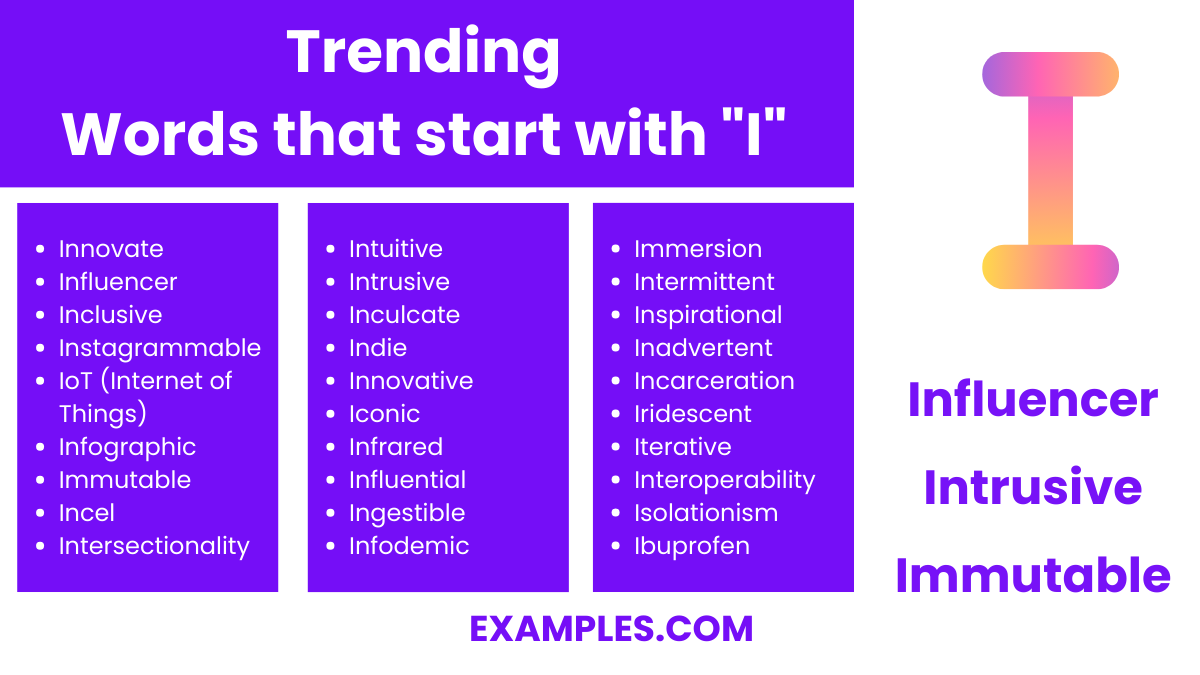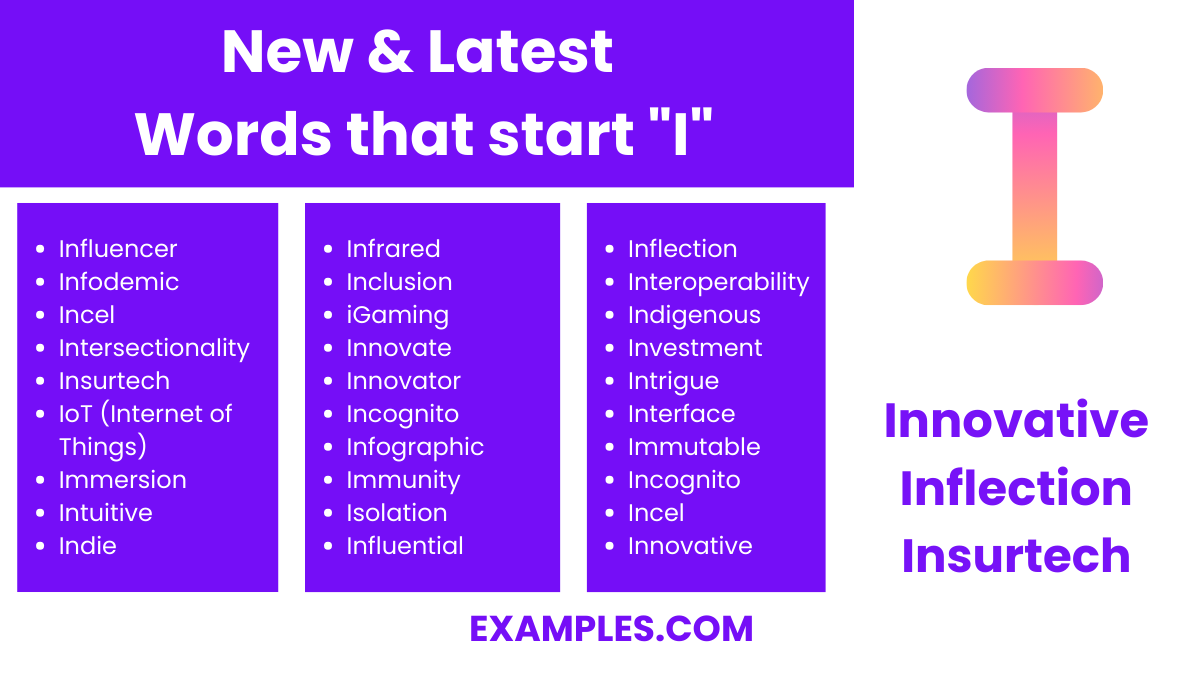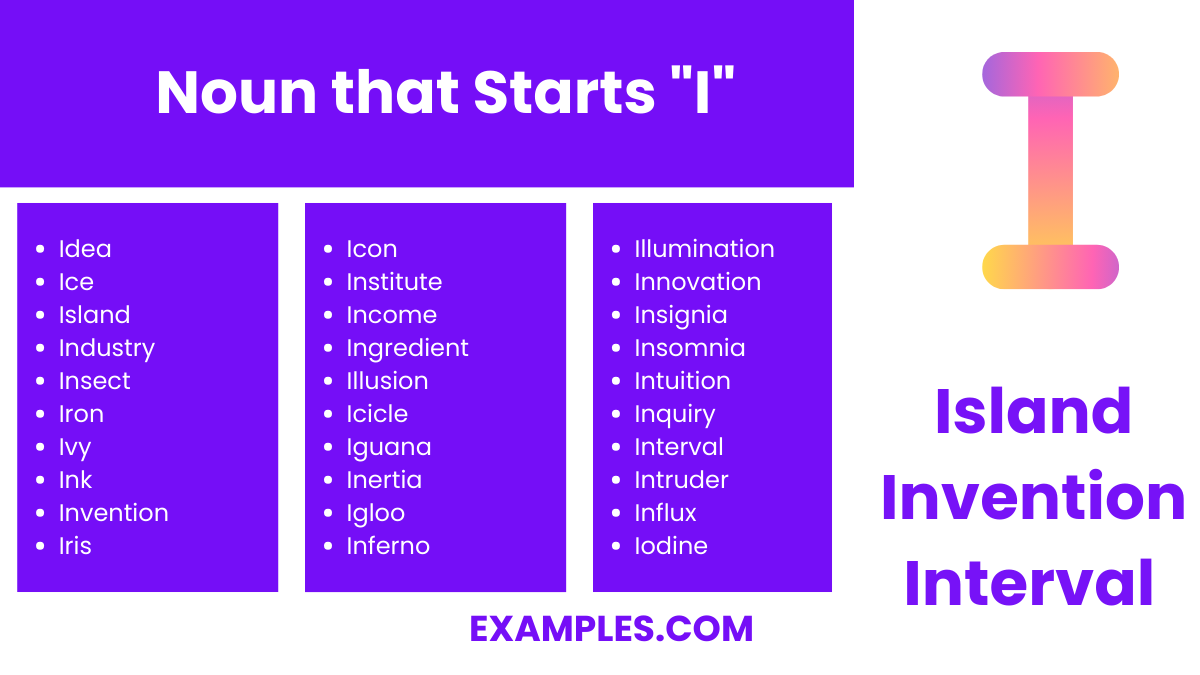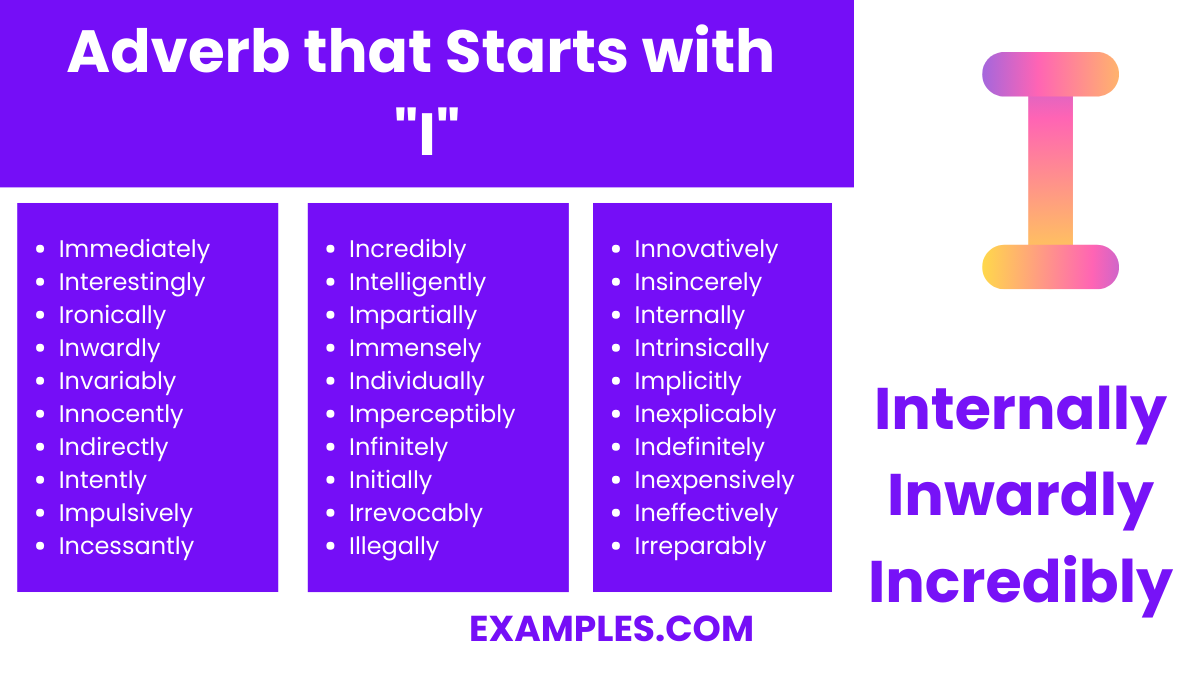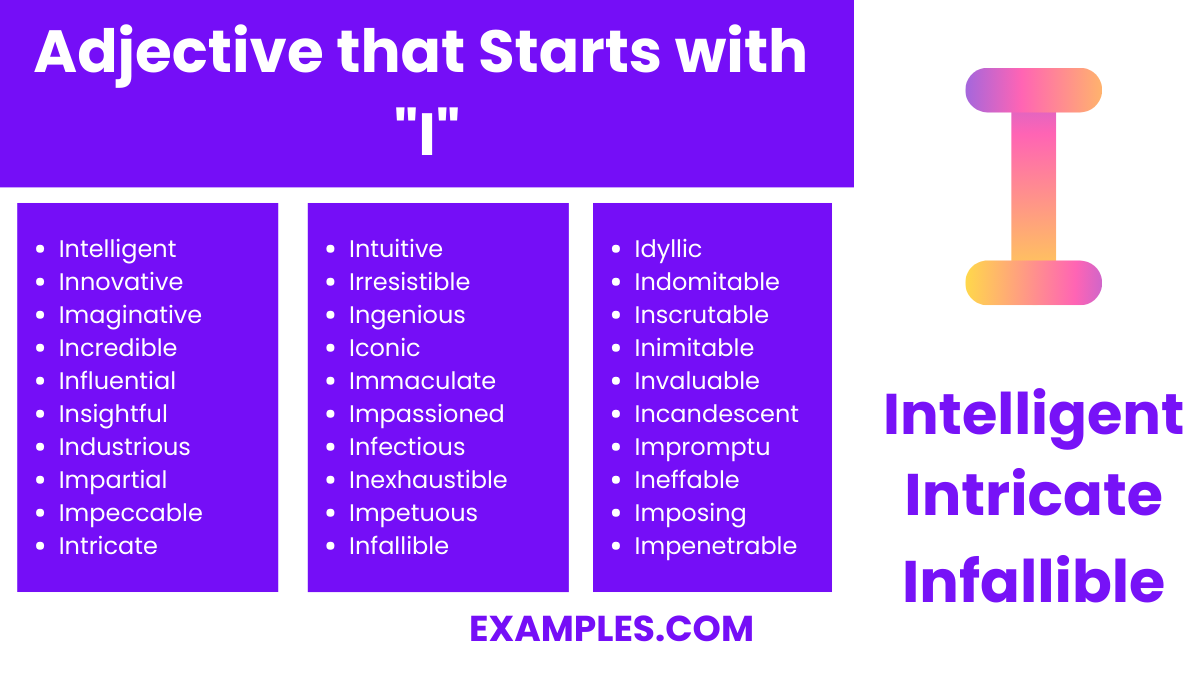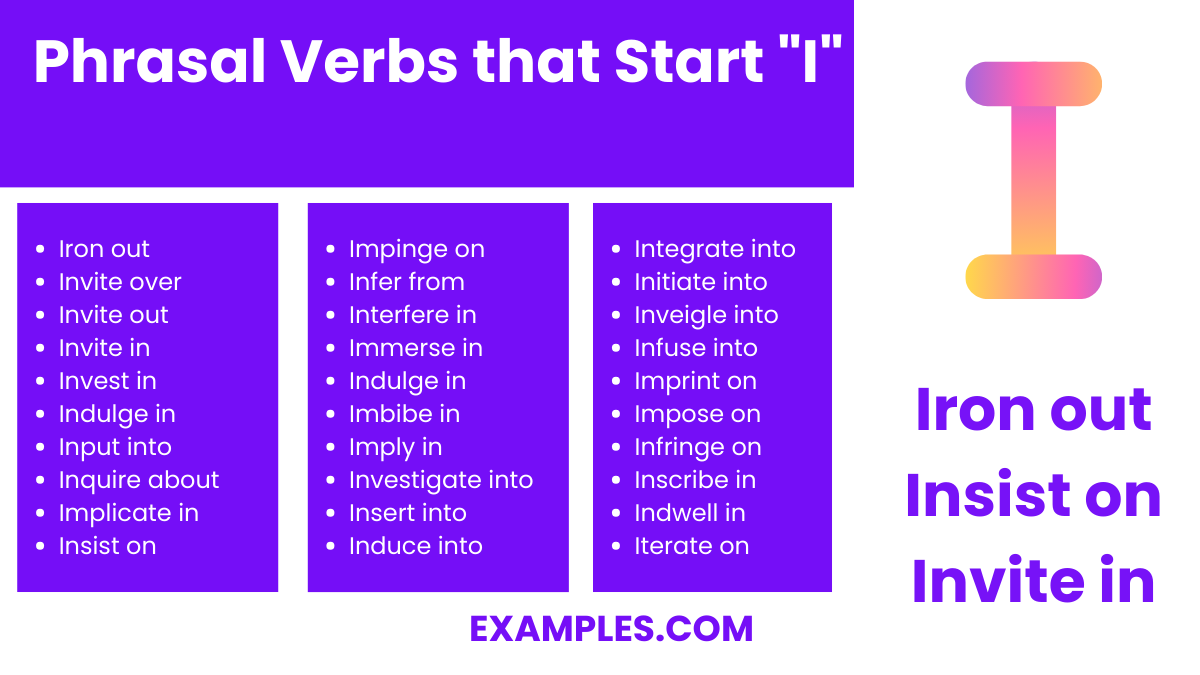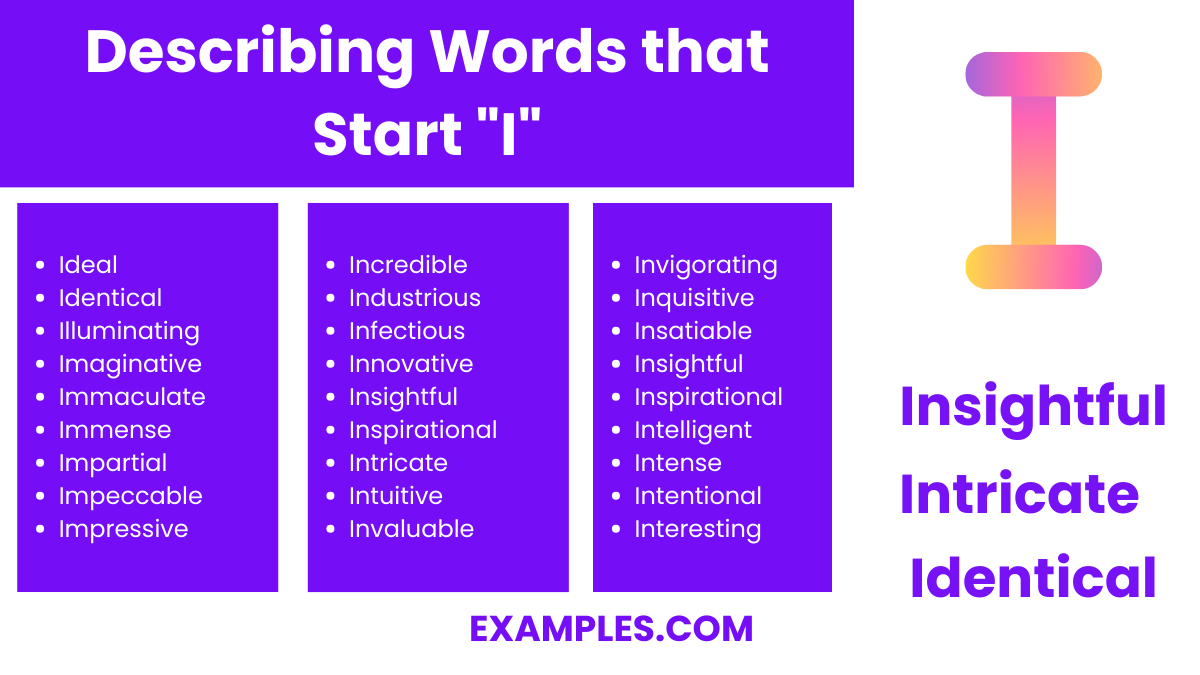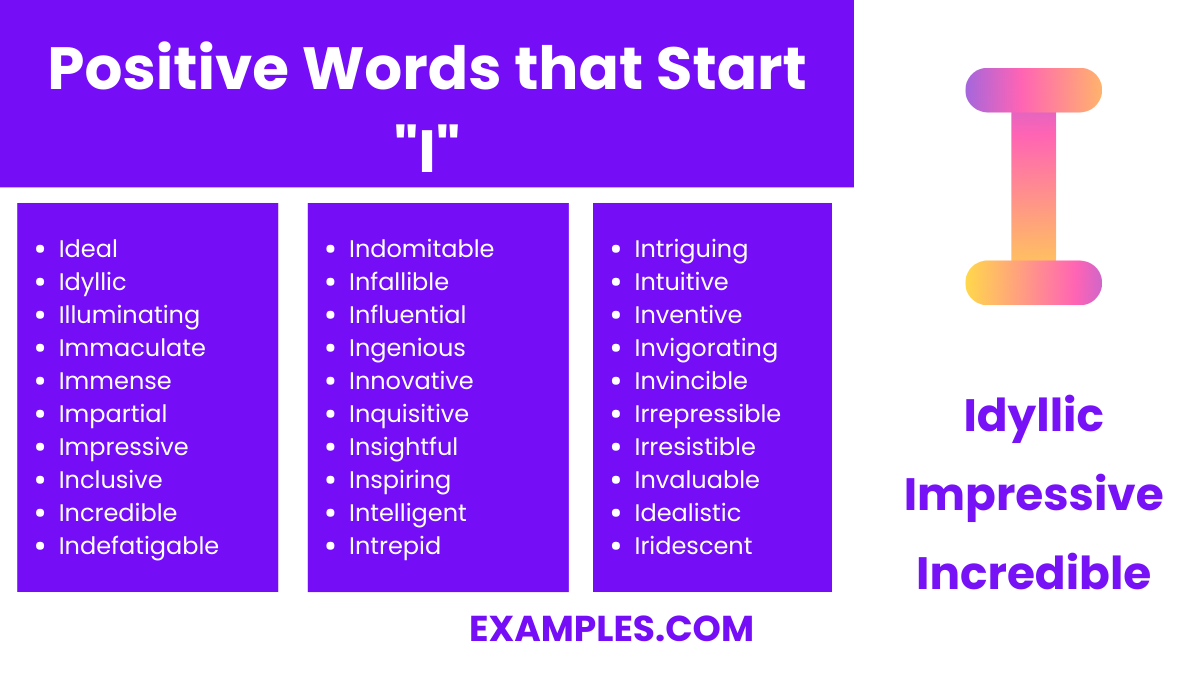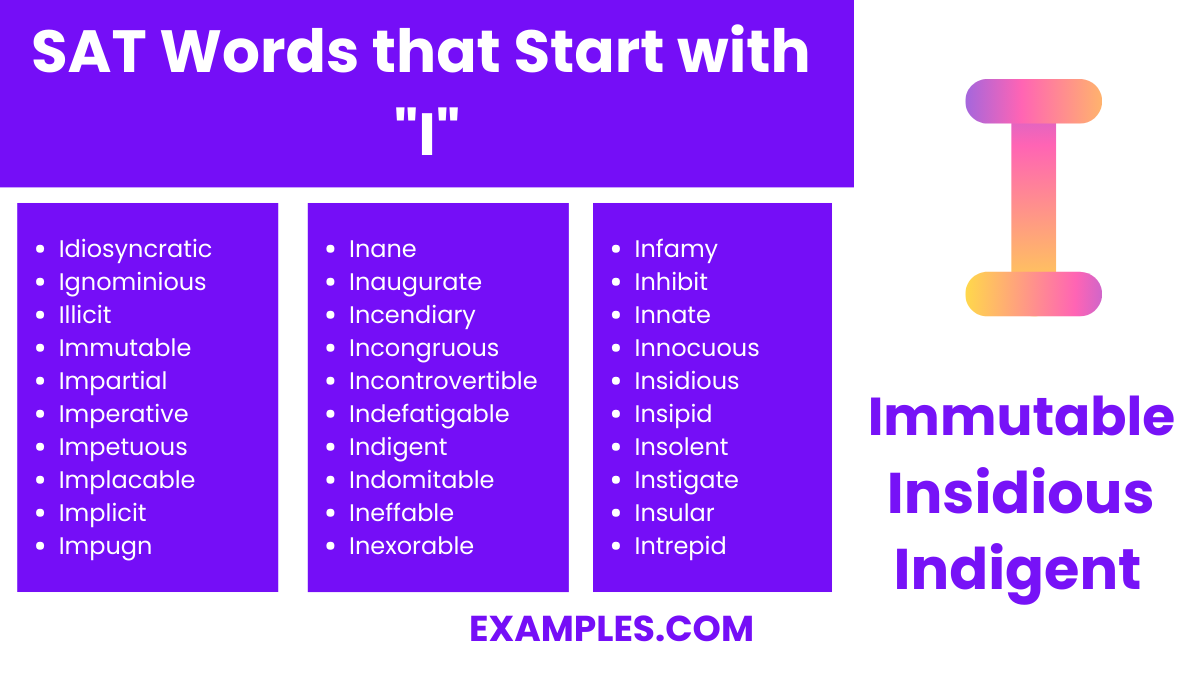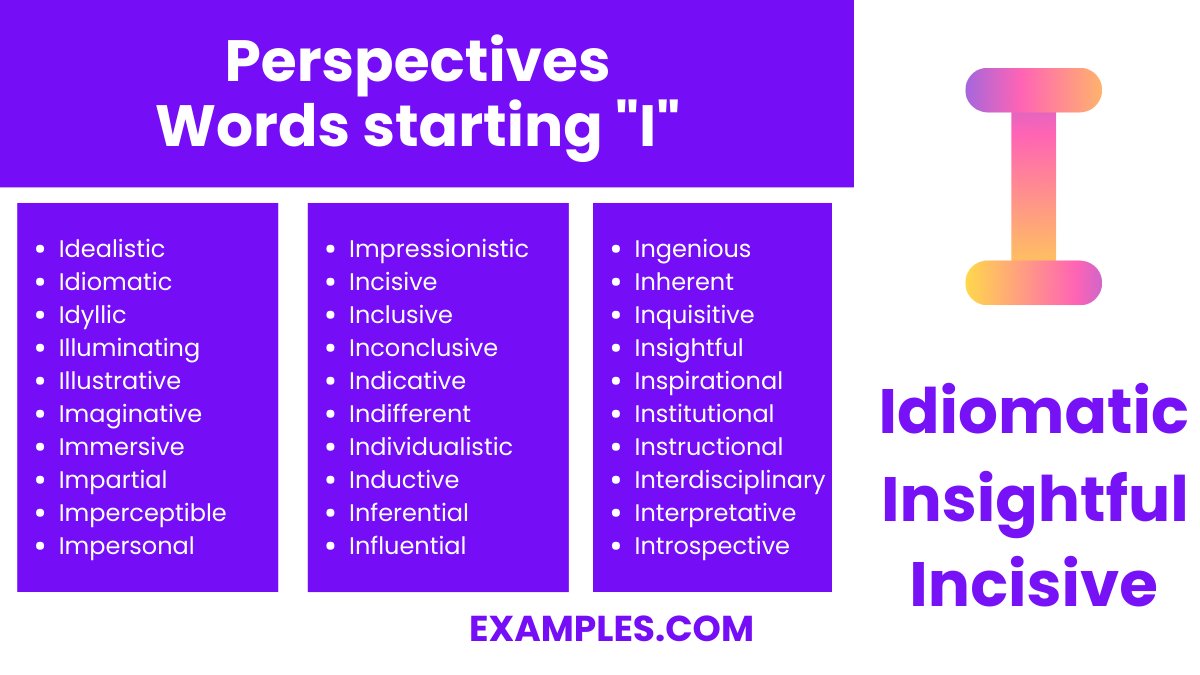450+ Words Starting with I List, Meaning, PDF
Words that start with the letter “I,” a key part of the English language. This comprehensive guide delves into a vast array of ‘I’ words, revealing their importance in various contexts. From everyday communication to academic writing, ‘I’ words inject insight and intrigue into our language. They encompass a broad spectrum of meanings, from the tangible to the abstract, making them indispensable in both spoken and written forms. Whether you’re aiming to inject creativity into your vocabulary or seeking to inspire with impactful words, this guide provides valuable insights and examples to help you integrate ‘I’ words effectively into your linguistic repertoire.
Download Most Commonly used Words that Start with I - PDF
300+ Most Commonly used Words that Start with “I”
| Icon | Idealism | Idiom | Ignite | Illuminate | Illustrate |
| Imbibe | Immolate | Impart | Impede | Implement | Implicate |
| Impose | Impress | Imprint | Improvise | Incise | Include |
| Indulge | Infer | Inflict | Ingrain | Inhabit | Initiate |
| Inject | Inquire | Inscribe | Inspect | Inspire | Install |
| Instruct | Integrate | Interact | Intercept | Interject | Interlace |
| Interlink | Interpret | Interrupt | Intervene | Interview | Intimate |
| Intone | Inundate | Invert | Investigate | Invigorate | Invite |
| Involve | Ionize | Irradiate | Iterate | Idealize | Identify |
| Idolize | Ignite | Ignore | Illuminate | Imbue | Immerse |
| Immortalize | Impair | Impact | Impel | Implode | Import |
| Impose | Incentivize | Incline | Increase | Indicate | Indict |
| Induce | Inebriate | Infuse | Ingest | Ingratiate | Inhibit |
| Initiate | Inject | Innovate | Input | Inscribe | Insulate |
| Integrate | Intensify | Intercede | Interconnect | Interface | Interject |
| Interlope | Interpolate | Interpret | Intersect | Intervene | Intimidate |
| Intrigue | Invalidate | Invest | Invigilate | Involve | Ionize |
| Irrigate | Isolate | Itemize | Ignite | Illuminate | Imbibe |
| Imbricate | Immigrate | Immobilize | Immunize | Impact | Impinge |
| Implant | Implement | Implicate | Implicit | Importune | Impose |
| Impress | Imprint | Improvise | Incarcerate | Incarnate | Incense |
| Incentivize | Incept | Inch | Incite | Incline | Include |
| Incorporate | Increase | Incubate | Indent | Index | Indicate |
| Indite | Induce | Indulge | Infect | Infer | Infest |
| Infiltrate | Inflame | Inflate | Inflect | Inform | Infuse |
| Ingest | Ingratiate | Inhabit | Inherit | Inhibit | Initiate |
| Inject | Injure | Ink | Inlay | Inscribe | Insert |
| Insinuate | Insist | Inspect | Inspire | Install | Instigate |
| Instruct | Insulate | Insure | Integrate | Intend | Intensify |
| Interact | Intercept | Interest | Interface | Interject | Interlace |
| Interlink | Interlock | Interlude | Internalize | Intern | Interpolate |
| Interpret | Interrelate | Interrogate | Interrupt | Intersperse | Intertwine |
| Intervene | Interview | Intimate | Intone | Intoxicate | Intrigue |
| Introduce | Intrude | Intuit | Invade | Invalidate | Inveigh |
| Inveigle | Invent | Inventory | Invert | Investigate | Invigorate |
| Invite | Invoke | Involve | Ionize | Irradiate | Irrigate |
| Irritate | Isolate | Issue | Itemize | Iterate | Idealize |
| Ideate | Idolize | Ignite | Ignoble | Illuminate | Illustrate |
| Imbibe | Imbricate | Imbue | Imitate | Immaculate | Immense |
| Immigrate | Immobilize | Immolate | Immortalize | Immunize | Impair |
| Impale | Impart | Impassion | Impede | Impel | Imperil |
| Impinge | Implacable | Implement | Implicate | Implore | Imply |
| Importune | Impose | Impress | Imprint | Imprison | Improvise |
| Incant | Incentivize | Incise | Include | Inculcate | Indebt |
| Indicate | Indict | Indite | Induce | Indulge | Infect |
| Infer | Infest | Inflict | Inflame | Inflate | Inflect |
| Inform | Infringe | Ingulf | Inhabit | Inherit | Inhibit |
| Initiate | Inject | Injure | Inlay | Inscribe | Insert |
| Insinuate | Inspect | Inspire | Install | Instigate | Instruct |
| Insulate | Insure | Integrate | Interact | Intercept | Intermingle |
| Interpose | Interpret | Interrelate | Interrogate | Interrupt | Intersperse |
| Intervene | Intimate | Intone | Intoxicate | Intrigue | Introduce |
| Intrude | Intuit | Invalidate | Inveigle | Invent | Invert |
| Investigate | Invigorate | Invite | Invoke | Involve | Ionize |
| Irradiate | Irritate | Iterate | Ice | Icon | Idea |
| Idol | Igloo | Ignite | Ignore | Illuminate | Illusion |
| Image | Imitate | Immense | Impact | Impel | Imperfect |
| Implement | Imply | Import | Improve | Impulse | Incentive |
| Include | Income | Increase | Indicate | Individual | Industry |
| Inevitable | Infect | Infer | Inflate | Influence | Inform |
| Inhabit | Inherit | Inject | Injure | Ink | Innovate |
| Input | Inquiry | Insect | Insert | Insight | Insist |
| Install | Instant | Instead | Instinct | Institute | Insulate |
| Insult | Insure | Integrate | Intend | Intense | Interest |
| Interior | Internal | Interpret | Interrupt | Interval | Interview |
| Introduce | Invent | Invest | Investigate | Invite | Involve |
| Iron | Island | Issue | Item | Itself | Impulse |
| Incline | Indulge | Influence | Inscribe | Inspect | Inspire |
| Institute | Integrate | Interact | Interfere | Internalize | Intervene |
| Introduce | Invalidate | Invigorate | Ionize | Irrigate | Iterate |
Most Trending Words that Starts with “I”
In today’s rapidly changing linguistic landscape, the allure of words beginning with “I” captures the essence of modern dialogue and thought. These rhyming words mirror the pace of cultural evolution, technological strides, and social dynamics, making them quintessential for an up-to-date curriculum. For educators, weaving these “I” words into teachings not only maintains the relevance of lessons but also heightens student engagement, providing a bridge to contemporary daily use English words and the complexities of current discourse.
- Innovate – to introduce something new or different.
- Influencer – a person who has the ability to influence potential buyers of a product or service.
- Inclusive – including all; not excluding any part or group.
- Instagrammable – suitable for being posted on the social media platform Instagram.
- IoT (Internet of Things) – the interconnection of everyday devices via the internet.
- Infographic – a visual representation of information or data.
- Immutable – unchanging over time or unable to be changed.
- Incel – involuntarily celibate; a member of an online subculture.
- Intersectionality – the interconnected nature of social categorizations.
- Intuitive – using or based on what one feels to be true.
- Intrusive – causing disruption or annoyance.
- Inculcate – instill by persistent instruction.
- Indie – independent, especially in the arts.
- Innovative – featuring new methods; advanced and original.
- Iconic – widely recognized and well-established.
New & Latest Added Words that Starts with “I”
The continuous evolution of language ushers in a plethora of new terms, particularly those starting with “I,” signifying a treasure trove for educators aiming to stay at the forefront of pedagogical effectiveness. These novel entries, often born from the digital age’s innovations and the ebb and flow of cultural tides, infuse curricula with freshness and relatability. Featuring these singular & plural words in educational settings can transform learning into an exciting exploration of modern Christmas words and the vibrant spectrum of today’s communication landscape.
- Influencer – a person who is able to influence potential buyers of a product or service.
- Instagrammable – suitable for being photographed and posted on Instagram.
- Infodemic – an excessive amount of information about a problem, making it difficult to identify a solution.
- Incel – an involuntary celibate; a person who is unable to find a romantic or sexual partner.
- Intersectionality – the interconnected nature of social categories such as race, class, and gender.
- Insurtech – technology innovations aimed at maximizing savings and efficiency in the insurance industry.
- IoT (Internet of Things) – the interconnection of everyday objects via the internet.
- Immersion – deep mental involvement or engagement in a particular activity or subject.
- Intuitive – based on what one feels to be true even without conscious reasoning.
- Indie – an independent, often low-budget artistic production or creator.
- Infrared – light waves longer than visible light but shorter than radio waves.
- Inclusion – the act of including or being included within a group or structure.
- iGaming – online gambling and betting activities.
- Innovate – to introduce new methods, ideas, or products.
- Innovative – featuring new methods; original and advanced.
Noun that Starts with “I”
Delving into the realm of nouns with “I” as their initial letter offers a multifaceted approach to vocabulary enhancement in educational spheres. This diverse collection spans from the tangible to the abstract, encompassing everything from scientific terminology to literary expressions. Such compound words serve as vital components for comprehensive language education, enabling teachers to draft lessons that not only expand students’ lexical range but also deepen their understanding of various subjects, thereby enriching the consonant words of communication.
- Idea – a thought or suggestion as a possible course of action.
- Ice – frozen water, a brittle transparent crystalline solid.
- Island – a piece of land surrounded by water.
- Industry – economic activity concerned with the processing of raw materials.
- Insect – a small arthropod animal with six legs.
- Iron – a strong, hard magnetic metal used for construction.
- Ivy – a woody evergreen climbing plant.
- Ink – a colored fluid used for writing.
- Invention – the action of inventing something.
- Iris – a flat, colored, ring-shaped membrane behind the cornea of the eye.
- Icon – a person or thing regarded as a representative symbol.
- Institute – an organization having a particular purpose, especially in education.
- Income – money received for work or through investments.
- Ingredient – a component part of any mixture.
- Illusion – a deceptive appearance or impression.
Adverb that Starts with “I”
Adverbs that start with “I” enrich the tapestry of English grammar, providing nuanced layers to sentence construction. These linguistic elements, essential for nuanced expression and clarity, are as fundamental to language learning as the building blocks of describing words and dictation words. By incorporating these adverbs into educational narratives, teachers can guide students toward a more refined expression, fostering an environment where clarity and depth of difficult words are celebrated and mastered.
- Immediately – without any delay.
- Interestingly – in an interesting manner.
- Ironically – in an ironic manner.
- Inwardly – with no outward manifestation.
- Invariably – in every case or on every occasion.
- Innocently – in a manner not intended to cause harm.
- Indirectly – not in a direct course or path.
- Intently – with earnest and eager attention.
- Impulsively – in a manner of acting on a sudden urge.
- Incessantly – without interruption; constantly.
- Incredibly – to an extraordinary degree.
- Intelligently – in an intelligent manner.
- Impartially – in a fair and unbiased manner.
- Immensely – to a great extent; extremely.
- Individually – separately and distinctly.
Adjective that Starts with “I”
“I” adjectives are a cornerstone in the architecture of language, offering educators a palette to enhance the descriptive prowess of their students. These words, akin to encouraging words, not only enrich narratives but also embolden students to delve into more intricate descriptions, painting their thoughts with a broader stroke of creativity. Integrating these adjectives into the educational framework encourages a deeper exploration of language, much like the joy found in discovering new funny words, thereby broadening the horizon of expression and comprehension.
- Intelligent – having or showing intelligence, especially of a high level.
- Innovative – featuring new methods; advanced and original.
- Imaginative – having or showing creativity or inventiveness.
- Incredible – impossible to believe.
- Influential – having great influence on someone or something.
- Insightful – having or showing an accurate and deep understanding.
- Industrious – diligent and hard-working.
- Impartial – treating all rivals or disputants equally.
- Impeccable – in accordance with the highest standards; faultless.
- Intricate – very complicated or detailed.
- Intuitive – using or based on what one feels to be true.
- Irresistible – too attractive and tempting to be resisted.
- Ingenious – clever, original, and inventive.
- Iconic – widely recognized and well-established.
- Immaculate – perfectly clean, neat, or tidy.
Phrasal Verbs that Starts with “I”
Phrasal verbs commencing with “I” inject vitality into English learning, underscoring the language’s dynamic nature. For educators, these verbs are indispensable tools for demystifying the nuances of everyday English, bridging the gap between textbook grammar and the living, breathing language of conversation. This collection, resonant with the utility of Ness words, enhances students’ communicative competence, offering pathways to express complex ideas through Pictionary words and fostering a more intuitive grasp of English nuances.
- Iron out – to remove difficulties or find solutions.
- Invite over – to ask someone to come to your home.
- Invite out – to ask someone to go out, usually to a restaurant or for a social activity.
- Invite in – to ask someone to enter a place.
- Invest in – to put money, effort, time, etc., into something to make a profit or get an advantage.
- Indulge in – to allow oneself to enjoy the pleasure of something.
- Input into – to provide input or information.
- Inquire about – to ask for information.
- Implicate in – to show that someone is involved in something (usually a crime).
- Insist on – to demand something forcefully, not accepting refusal.
- Impinge on – to have an effect on, limit, or interfere.
- Infer from – to form an opinion or guess that something is true because of the information that you have.
- Interfere in – to get involved in and try to influence a situation that does not concern you.
- Immerse in – to become completely involved in something.
- Indulge in – to allow oneself to enjoy something.
Describing Words that Starts with “I”
Exploring describing words that start with “I” unveils a rich lexicon of adjectives that can transform ordinary sentences into captivating narratives. These “I” adjectives range from illustrating intense emotions and intricate details to defining innovative concepts and identities. Such descriptive prowess is essential in crafting compelling stories, persuasive arguments, and clear communications. Integrating these adjectives with praising words amplifies positive reinforcement, encouraging a supportive and affirmative discourse. Similarly, these adjectives enrich the collection of vowel words, diversifying the ways in which vowels can lead expressions and ideas. This journey through “I” adjectives not only enhances linguistic skills but also fosters a deeper appreciation for the nuanced and vibrant nature of the English language
- Ideal – perfect; most suitable.
- Identical – exactly alike; similar in every detail.
- Illuminating – providing insight or clarity.
- Imaginative – having creativity or inventiveness.
- Immaculate – perfectly clean or neat.
- Immense – extremely large or great.
- Impartial – treating all rivals or disputants equally.
- Impeccable – in accordance with the highest standards.
- Impressive – evoking admiration through size, quality, or skill.
- Incredible – hard to believe; extraordinary.
- Industrious – diligent and hardworking.
- Infectious – likely to spread or influence others.
- Innovative – featuring new methods; advanced and original.
- Insightful – having or showing an accurate understanding.
- Inspirational – providing or showing creative or spiritual inspiration.
Positive Words that Starts with “I”
Incorporating positive “I” words into the educational discourse acts as a catalyst for fostering a nurturing and optimistic classroom atmosphere. These encouraging words, imbued with positivity, not only elevate spirits but also promote a culture of affirmation and motivation. By highlighting these sight words in lessons and interactions, educators can cultivate an environment where positive reinforcement thrives, empowering students to communicate with confidence and a constructive outlook.
- Ideal – representing the best of its kind.
- Idyllic – extremely happy, peaceful, or picturesque.
- Illuminating – enlightening spiritually or intellectually.
- Immaculate – perfectly clean or neat; flawless.
- Immense – extremely large or great; vast.
- Impartial – fair and just; unbiased.
- Impressive – evoking admiration through quality or skill.
- Inclusive – including all; not excluding any part.
- Incredible – marvelous; extraordinarily good.
- Indefatigable – persisting tirelessly; untiring.
- Indomitable – impossible to subdue or defeat.
- Infallible – incapable of making mistakes.
- Influential – having great influence.
- Ingenious – clever, original, and inventive.
- Innovative – introducing new ideas; original.
SAT Words that Starts with “I”
For educators aiming to enhance their students’ SAT vocabulary, focusing on words starting with “I” can be incredibly impactful. These words, often found in SAT exams, are not just challenging but also enlightening, helping students expand their understanding and usage of advanced vocabulary. Incorporating these “I” words into teaching methodologies aids students in developing critical reading and writing skills, essential for SAT success.
- Idiosyncratic – peculiar or individual.
- Ignominious – deserving or causing public disgrace or shame.
- Illicit – illegal or forbidden by law.
- Immutable – unchanging over time or unable to be changed.
- Impartial – treating all rivals or disputants equally.
- Imperative – of vital importance; crucial.
- Impetuous – acting or done quickly without thought or care.
- Implacable – unable to be placated.
- Implicit – implied though not plainly expressed.
- Impugn – dispute the truth, validity, or honesty of.
- Inane – silly or stupid.
- Inaugurate – begin or introduce a system, policy, or period.
- Incendiary – designed to cause fires or conflict.
- Incongruous – not in harmony or keeping with the surroundings.
- Incontrovertible – not able to be denied or disputed.
- Indefatigable – persisting tirelessly.
- Indigent – poor or needy.
- Indomitable – impossible to subdue or defeat.
- Ineffable – too great or extreme to be expressed in words.
- Inexorable – impossible to stop or prevent.
- Infamy – the state of being well known for some bad quality.
- Inhibit – hinder, restrain, or prevent.
- Innate – inborn or natural.
- Innocuous – not harmful or offensive.
- Insidious – proceeding in a gradual, subtle way with harmful effects.
- Insipid – lacking flavor or interest.
- Insolent – showing a rude or arrogant lack of respect.
- Instigate – bring about or initiate.
- Insular – ignorant of or uninterested in cultures outside one’s own.
- Intrepid – fearless or adventurous.
Perspectives Words that Starts with “I”
Introducing perspectives words starting with “I” is a key approach for teachers to enhance students’ understanding of varied viewpoints and complex ideas. These words, rich in meaning and nuance, are essential in developing critical thinking and analytical skills. They help students articulate different perspectives and opinions, fostering a deeper engagement with texts and discussions. The following list of “I” words is carefully curated to include terms that are significant in exploring various perspectives. These words can be used in classroom debates, essay writing, and other educational settings to encourage students to think broadly and express their thoughts effectively.
- Idealistic – characterized by idealism; unrealistically aiming for perfection.
- Idiomatic – using expressions natural to a native speaker.
- Idyllic – extremely happy or picturesque.
- Illuminating – providing insight, clarity, or enlightenment.
- Illustrative – serving as an example or explanation.
- Imaginative – having creativity or inventiveness.
- Immersive – engaging deeply; involving.
- Impartial – unbiased or neutral.
- Imperceptible – impossible or difficult to perceive.
- Impersonal – not influenced by personal feelings.
- Impressionistic – based on subjective reactions.
- Incisive – intelligently analytical and clear-thinking.
- Inclusive – including all; not excluding any part.
- Inconclusive – not leading to a firm conclusion.
- Indicative – serving as a sign or indication of something.
- Indifferent – having no particular interest or sympathy.
- Individualistic – emphasizing the importance of individuality.
- Inductive – characterized by the inference of general laws.
- Inferential – based on or involving inference.
- Influential – having great influence on someone or something.
- Ingenious – clever, original, and inventive.
- Inherent – existing in something as a permanent attribute.
- Inquisitive – curious or inquiring.
- Insightful – having deep understanding.
- Inspirational – providing or showing creative inspiration.
- Institutional – relating to a large and important organization.
- Instructional – relating to teaching or instruction.
- Interdisciplinary – involving two or more academic disciplines.
- Interpretative – providing an interpretation.
- Introspective – characterized by examination of one’s own thoughts.
In summary, understanding and utilizing words that start with ‘I’ enriches students’ vocabulary and enhances their ability to articulate complex ideas and perspectives. Whether preparing for the SAT or exploring various viewpoints in discussions, these words are fundamental in building linguistic proficiency. By integrating these words into your teaching strategy, you encourage students to think critically, express themselves eloquently, and engage effectively with diverse subjects and ideas.


